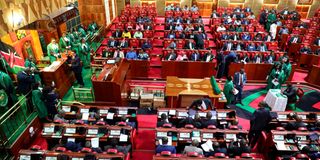Missing records helped 260 MPs avoid ouster for skipping sittings

MPs take the oath of office at the National Assembly on September 8, 2022.
Missing records in the 12th Parliament helped save 260 members of the National Assembly from losing their seats despite missing more than the minimum sittings in a session required to force them out.
Details from the Parliament’s records office show that two of the truant legislators—former MPs Raymond Moi (Rongai) and Alex Kosgey (Emgwen)—skipped 102 and 79 sittings respectively.
Mr Moi and Mr Kosgey lost their seats in the August 9 General Election. The others missed more than 50 sittings during the session, enough to cause a by-election.
Article 103 of the Constitution mandates the Speaker of the House to declare a seat vacant if a member fails to attend eight sittings in a session (usually one year).
“The office of an MP becomes vacant if during any session of Parliament, the member is absent from eight sittings of the relevant House without permission in writing from the Speaker and is unable to offer a satisfactory explanation for the absence,” the Article reads.
A paper presented to the members of the National Assembly during their induction at a city hotel indicates that the missing parliamentary records was due to the transition from analogue to digital.
Previously, MPs were required to record their presence in the debating chamber by writing down their names and signing against them at the entry to the chamber. The data would then be collected and stored.
Currently, the members are only required to record their presence in the chamber by entering their biometric details at the entry to the chamber.
“A probe was initiated to establish how this had happened, only to discover that the records were lost during the transition from analogue record keeping to digital. The truant members could, therefore, not be punished on account that the information to fix them was missing. That is how they survived,” the paper said.
“With the automation of the House records, it will be easier in the 13th Parliament and beyond to identify those who skip parliamentary sittings without a written permission from the Speaker as required by the Constitution.
”But even as this emerged, MPs attending the induction protested that the provision disadvantages them, saying they have too much to do at the constituency level.
They were in agreement that Parliament should not even bother fixing the constitutional provision in the rules—whether informing the Speaker on a member’s absence should extend to text or WhatsApp messaging.
Rarieda MP Otiende Amollo said the ambiguity in law will help the members escape any attempt to have them recalled.
“I want to warn you, members, that you let this matter be as unclear as possible. If you want to specify the mode to notify the Speaker, you will make it so easy for someone to remove you from office. I want to warn you that if you do this, 90 per cent of you will not make it,” said Mr Amollo, who was among the experts who wrote the Constitution.
“When we were making this law, we said eight sessions because we wanted members to attend sessions. What I didn’t know was the fact that I would also be a member. I have come to realise that it is so easy to skip eight sessions. What helped some of us in the last Parliament is the ambiguity in law.”





